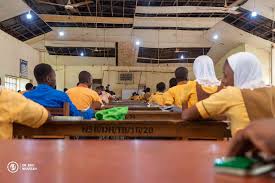WAEC Igbo Syllabus 2025/2026
Studying using this approved WAEC Igbo Syllabus 2025/2026 will help you ace the WAEC Biology exam. Quit studying aimlessly. Learn wisely!
Get it now!
Writing Biology on WAEC Examination For anyone studying for the WAEC exam and planning to write a biology paper, this syllabus is a great resource.
It outlines the essential readings for your tests as well as the primary subjects that will be examined, such as the fundamentals of life, evolution and adaptation, animal support systems, and heredity.
You will receive a list of suggested textbooks and other study materials to aid in your exam preparation in addition to a list of subjects and their goals.
- WAEC Store Keeping Syllabus 2025/2026
- WAEC Commerce Syllabus 2025/2026
- WAEC Geography Syllabus 2025/2026
- WAEC Hausa Syllabus Syllabus 2025/2026
- WAEC Food and Nutrition Syllabus 2025/2026
Contents
PREAMBLE
Anyone who wants to understand the Igbo people in their entirety must have a solid understanding of their language, literature, and culture.The Igbo syllabus is created for candidates studying Igbo based on this. Sufficient care has been taken to guarantee that candidates review the Igbo language rubrics.Important linguistic topics like grammar, sound system, culture, worldview, etc. are covered in the syllabus.
The syllabus’s goals
The following are the syllabus’s goals:
- ● To equip candidates with the tools they need to communicate effectively in Igbo;
- ● To familiarize them with the language’s grammatical structures, sound system, and other features;
- ● To expose them to Igbo culture, including its customs, institutions, and worldview.
WAEC Igbo Syllabus 2025/2026
| WAEC IGBO LANGUAGE SYLLABUS | ||
| SN | TOPICS | OBJECTIVES |
| PAPER 1 | ||
| A | LANGUAGE | i. Comprehension (2 short passages) ii. Composition/letter writing iii. Sound system iv. Grammar v. Translation |
| B | LITERATURE | i. Basic Principles of Literary Appreciation ii. Oral Literature (Prose, Poetry, Drama) iii. Written Literature (Prose, Poetry, Drama) |
| PAPER 2 | ||
| A | ESSAY | Part I: Composition/ Letter Writing Candidates are advised not to spend more than 45 minutes on this section. There will be five topics from the following essay types and candidates will be expected to write on one of them in about 300 words: (1) Narrative; (2) Descriptive; (3) Argumentative; (4) Expository; (5) Dialogue; (6) Debate; (7) Letter writing. Part II: Sound system Two questions will be set for candidates to answer one of them. The questions will test candidate’s basic knowledge of the following areas: (a) Igbo Phonemes: Vowels, Consonants, the Syllabic nasal, (i) their production, and (ii) their classification. (b) Syllable Structure. (c) Sound Processes: vowel harmony, vowel assimilation, vowel elision and consonants elision. (d) Tone and tone notation. (e) The Igbo alphabet. Part III: Grammar Two questions will be set for candidates to answer one of them. The questions will test candidate’s knowledge of the following areas: (a) Spelling rules. (b) Word formation. (c) Igbo dialects and Standard Igbo. (d) Loan words. (e) Igbo metalanguage (new words). (f) Word classes: The noun, verb, pronoun, conjunction, preposition, etc. (g) Grammatical categories: tense, number and person. (h) Phrases and Clauses: their types and functions. (i) Sentences: i. their constituents and types. ii. Sentences containing Direct and Indirect Speech. (j) Lexis and Structure. (k) Punctuation marks. |
| B | LITERATURE | Part I: Oral Literature Three questions will be set for this part and candidates will be required to answer only one of them. All questions in this section will be based on the prescribed texts. In this part, candidates will be required to have basic knowledge of the following: (a) Definiton and characteristics of oral Literature (b) Classification and functions (c) Literary devices (d) Folktales (ifo) (e) Anecdotes (ụkabụilu) (f) Legends (nkọkịrịkọ/akụkọ dike) (g) Myths (nkọmịrịkọ/akụkọokike/mmalite) (h) Poems (abụ) (i) Songs (uri) (j) Proverbs (ilu) (k) Riddles (agwụgwa) (l) Chants (mbem) (m) Oral drama (ejije ọnụ) (n) Tongue twisters (okwuntụhi) Part II: Written Literature Three questions will be set for this part and candidates will be required to attempt only one. All questions in this section will be based on the prescribed texts. |
| C | CULTURE | The following areas will be covered. Customs – Omenala (a)i. Njirimara ndị Igbo-asụsụ, ejiji, omenala, ekpemekpe , agbambọ, dg. ii. Ekele ndị Igbo n’oge dị icheiche. (b) Mmemme -ọjị, ịtụ nzụ, ịkwọ aka ụtụtụ, ịgọ ọfọ, dg. (c) Nnabata ọbịa. (d) Ọmụmụ nwa – ile ọmụgwọ, ibi ugwu, ikupụta nwa, ịgụ aha, ịzụ ahịa nwa, ịhụ eze, dg. (e) Nkwenye – ịlọ ụwa, ọgbanje, nrọ, ihi/isi anụ, ịha/ịchụ mmiri, dg. (f) Emume – ọfala, ịbọ ụzọ, ịwa ji/iri ji, igbu ewuukwu,iru mgbede, ịwa akwa, akwamozu, ịgba mkpe, ịgụ afọ, mbarị, ụdara, dg. (g) Egwuregwu – egwu ụmụaka, ịgba/ịchụ oro, ịtụ okwe, ịzụ nchọrọkọtọ, ịkpọ okwe, mgba, ịkpọ ọga, okoso, egwu ọnwa, dg. (h) Nsọala/Arụ – ihensọ, ebensọ, anụnsọ, osisinsọ, ime ibeeṅe. ii. Institutions – Ewumewu (a) Ewumewu ọchịchị – ezinaụlọ, ndị eze ọdịnala, nze na ọzọ, ụmụọkpụ/ụmụada, otu ọgbọ, otu nzuzo, otu inyomdi, ụmụnna, ogbe, obodo. (b) Ewumewu mmekọrịta mmadụ na ibe ya – alụmalụ, ezinaụlọ, ịgọ ọgọ, nwanwa/nwadiala, ịgba ndụ, ịgba orikọ (c) Echichi – Lọọlọ, Iyọm, Ọmụ, Ezeji, Jioke, Atama. (d) Abamaba – Mmọnwụ,Ọkọnkọ, Ekpe, Ọmabe, Odo, Dibịa. (e) Ewumewu akụnaụba – ike ekpe, iri ekpe, ala na ihe dị na ya. (f) Akaọrụ – ịkpụ ụzụ, ịgba nta, ịkụ azụ, ọrụugbo, ịkwa nka, ịkpụ ite, dg. (g) Ewumewu ofufe – ịgba afa, ịchụ aja, dg. (h) Ngwa ofufe – ọfọ, ikenga, okpesi, ogu, ọtọnsi , dg (i) Ihe ofufe – Ndịichie, Arụsị, Ikenga, Ala, Mmụọ mmiri, Arụsị/ Agbara dịka Ogwugwu, Ahịajiọkụ, Agwụ, Amadịọha, Kamalụ, Agbala, Ibini Ụkpabị, Ojukwu, Igwekaala, Idemmili, dg. |
WAEC Recommended Igbo Textbooks 2025/2026
| YEAR | PROSE | POETRY | DRAMA |
| 1981-1983 | Oral – Omalinze Written – Urunwa Obinna | Abu Na Egwuregwuodinala Utara Nta | Obidiya |
| 1987 | Written Chinagorom | Abu Na Egwuregwuodinala Akpa UcheEke Nne | Ugomma |
| 1988 | Written Obiefuna | AkpaUche | AkuFechaa |
| 1989 | Written Uwaezuoke | AkpaUche | AkuFechaa |
| 1990 | Written Uwadiegwu | Nkemakolam | Obidiya |
| 1998-2000 | Oral Oka Mgba Written Dinta OkpaAkuEriEri | MbemnaEgwu Igbo AkubunduAkpaUche | Onwukube OkweAgbaala |
| 2002-2005 | Oral omalinze Written Juochi/Adaeze | Abx Na Egwuregwuodinala Utara Nta EchicheMiri Emi | UdoKaMma Aju Obi |
| 2006-2010 | Oral Oka Mgba Written Iheojoo GbaaAfa | Abu Akwamozu Echiche | NwataBulieNnaYaElu |
| 2011-2015 | Oral Mbediogu Written UjaDufuo Dike | Abu Na Egwuregwu Uche Bu Akpa | Aturu Ga-EpuMp |


